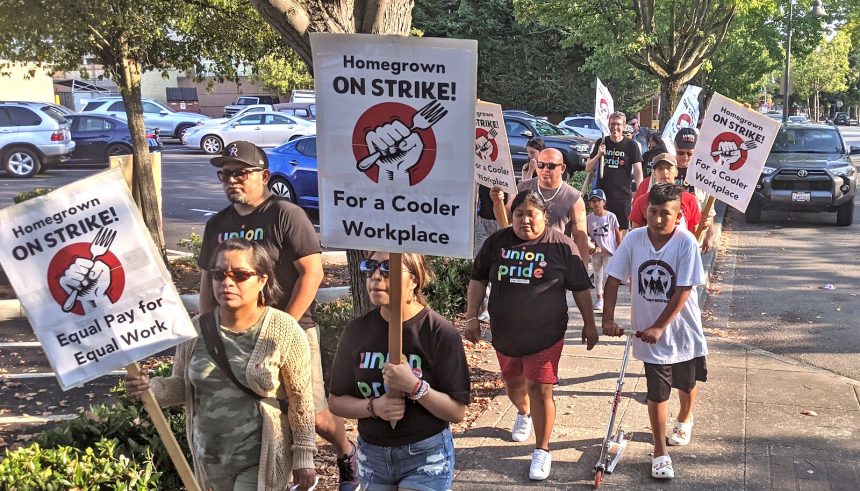Last month, Oscar Hernández found himself struggling to sleep. After working in a restaurant located inside a Las Vegas casino, he noticed that his body was not able to cool down properly once he returned home from his shifts. The air conditioning had been broken for approximately four months. Hernández endured eight-hour shifts during the busy brunch service, preparing a variety of dishes such as eggs, waffles, and fried chicken. He spent long hours in front of a scorching hot grill, which only operated at extremely high temperatures. Positioned in a corner of the kitchen, it seemed like all the heat sources in the area converged on his station, including gas burners, deep fryers, and a waffle iron.
With summer-like temperatures arriving early in Las Vegas, sometimes reaching triple digits in May, the inadequate fans provided by the owners were not strong enough to cool down the kitchen space. Although Hernández was no stranger to extreme heat, having worked in the restaurant industry for over two decades, the conditions at this particular restaurant were becoming unbearable. The heat inside the kitchen was so intense that he sometimes preferred the heat outside, where at least there was a breeze. Hernández began experiencing persistent headaches, and at home, he found himself becoming easily irritated with his children over minor things. “The heat inside a restaurant gets into your body,” Hernández expressed in Spanish. Despite knowing that rest was essential for recovery from overheating, he found himself unable to get the rest he needed, prompting him to resign from his position. “I am the sole provider for my family,” he explained. “So I made the decision to seek another job where I can work comfortably and hopefully get some sleep.”
Subsequently, Hernández secured a job at a different restaurant. Instances of workers enduring heat stress while working in the restaurant and food service industry are prevalent, especially for those stationed on the line, constantly cooking and prepping near hot stoves, ovens, and fryers. The industry workforce now faces the additional challenge of coping with record-breaking summer temperatures and heat waves beyond the confines of the kitchen. This convergence of indoor and outdoor heat exposure has motivated some workers to organize and advocate for stronger workplace protections.
Employees at a Seattle-based sandwich chain successfully negotiated historic heat protections in their initial union contract. Labor organizers anticipate a growing number of food service workers will collaborate and negotiate better working conditions concerning extreme heat. Yana Kalmyka, a volunteer organizer for the Emergency Workplace Organizing Committee, noted that heat-related issues at the workplace are increasingly common among workers.
With attribution science confirming that all heat waves are influenced by climate change, workers in the food industry are particularly vulnerable to the worsening environmental conditions. Farmworkers, delivery workers, and restaurant staff endure high indoor temperatures while also facing extreme outdoor heat, without sufficient regulations or safety measures. The industry’s stress on quick service and operational continuity presents challenges for workers to navigate demanding conditions, including historic heat waves.
Jason Flynn, a line cook in Chicago, pointed out that the fast-paced environment of commercial kitchens often compels workers to push through excessive heat exposure, leading to potential health risks. Disproportionately represented by women and people of color, restaurant workers like Hispanic individuals are typically assigned roles that expose them to high indoor temperatures with limited recourse. Immigrants and undocumented workers may fear retaliation for voicing concerns about workplace conditions, exacerbating existing climate injustices within their communities.
Indoor heat exacerbates the challenges for restaurant workers, as tall windows and limited climate control can intensify the heat in the work environment. Homegrown, a Seattle-based sandwich chain, recently secured heat protections for its workers after unionization efforts. Despite working indoors, Homegrown staff members have been impacted by Seattle’s historic heatwaves, which have been exacerbated by the lack of air conditioning in many areas. The workers successfully negotiated for temperature-based pay incentives in their contract to address extreme heat levels in the workplace.
The provision for time-and-a-half or double pay when temperatures exceed specified thresholds aims to incentivize employers to improve heat mitigation systems, such as repairing AC units and providing shade coverings. The unionization efforts at Homegrown serve as a milestone in addressing heat-related challenges faced by restaurant workers, highlighting the need for stronger safeguards and protections in the industry.






